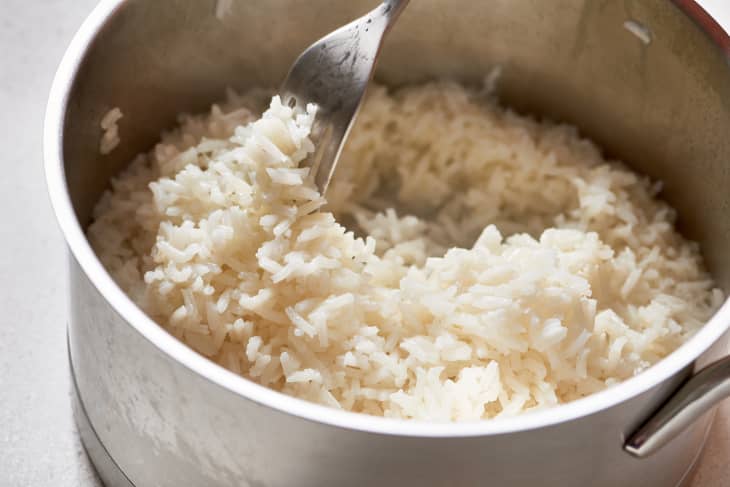
When I went away to college, I didn’t live in the dorms and had to fend for myself for food. As I started cooking for myself, rice was one of the first things I made in my postage-stamp-sized kitchen. I didn’t have the time, skills, or financial means to make myself the elaborate Chinese meals my grandmother spoiled me with, but I still craved Chinese food. One of the first things I started cooking was something many Chinese kids are taught as their first cooking lesson that makes rice better every single time: cooking it with Chinese sausage.
Cooking Chinese sausage (also known as lap cheong) with rice is a well-known cooking tip among Chinese families. Jada Wong, shopping director at The Kitchn, learned how to make it from her mom, and they had it at least once a month when she was growing up.
I remember my parents packing Chinese sausage and rice on a trip to Hawaii and somehow cooking it and serving it in our hotel room to save some money. It’s the first thing my nephews learned how to cook on their own to pack for school lunch. When I lived in Paris for close to a year, my first grocery haul from the Asian market included rice and Chinese sausage.
Why Chinese Sausage Makes Rice Taste Better
Chinese sausage cooked with rice is a really simple but delicious combination. The Chinese sausage perfumes the rice as it cooks, and the flavorful oil that comes out of it stains and flavors the rice just a little bit. The rice is comforting and filling, and the sweet-savory Chinese sausage has an intense-enough flavor that a little of it goes a long way. This cozy meal is easy to make, friendly on my wallet, and also makes fabulous leftovers or even the base of fried rice if I’m feeling like something different later on.
How to Cook Chinese Sausage with Rice
Making Chinese sausage with rice is as simple as it gets, which is why it’s such a kid-friendly idea if you have a rice cooker where all the kid has to do is push a button to turn it on. But even if you don’t have a rice cooker, the stovetop method will work just fine. Get the rice and water ready as you usually do — my preferred rice here is jasmine. Nestle a link or two of Chinese sausage into the uncooked rice — no need to cut it, as you don’t want all the juices to leak out.
From there, just cook the rice as you normally do. The Chinese sausage plumps up from the steam (and you can’t really overcook it) and lets out its yummy juices onto the rice. When the rice is done and you uncover it, the most delicious cloud of fragrance wafts up and always reminds me of home. Transfer the sausage to a cutting board and cut it up, then fluff the rice. Serve the rice and sausage drizzled with a little soy sauce, maybe with some stir-fried bok choy or Chinese broccoli alongside for a more complete meal, or crowned with a fried egg if you’re feeling extra.
If You’re Cooking Rice with Chinese Sausage, a Few Tips
- Chinese sausage is shelf-stable. Chinese sausage is often labeled as lap cheong, lap chong, or lap xuong. Because it’s cured, you won’t find it in the refrigerated or freezer sections of the store. It’s often on shelves near the meat counter or perhaps on the shelves above the open freezer or refrigerator cases. Chinese sausage is shelf-stable, at least until you open the package (then stash it in the fridge or freezer). If you’re limited on fridge space or like to just cook two links at once, some brands have packaging where two links are vacuum sealed together, making them super convenient if you don’t think you’ll use up a whole package quickly.
- Buy the right sausage. I prefer the sweet regular Chinese sausage, but there are other flavors out there made with liver or are spicy or extra lean. Read the package carefully to make sure you know what you’re getting.
- Don’t boil the rice. You want to keep the flavor in the water and rice, so use a cooking method where there’s a measured amount of water in the rice versus boiling the rice in lots of water and then draining it (and losing all that flavor).
The One Ingredient That Makes Rice 100x Better - The Kitchn
Read More

No comments:
Post a Comment